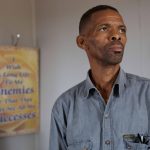Urban farmers wait on help from municipality
Residents farming tracts of municipal land around Uitenhage are struggling with minimal equipment and water while the Nelson Mandela Bay Municipality drags its feet on an urban agriculture policy t…
Author:
6 August 2019

Tracts of unused municipal land line the roadsides in most South African towns and cities. In the township areas of Uitenhage in the Eastern Cape, unemployment is high and fresh food is difficult to come by. But one activist is determined to turn these barren areas into urban farms that will benefit all those living in the area.
Although crops grow quickly, the pace of getting urban farms productive is slow because the aspirant urban farmers till the land by hand without any formal government support.
Virginia Kima, 67, has many decades of experience in political organising. She was once the secretary of her ward committee and is now an active member of the Makukhanye Women’s Forum (MWF), which was formed to support small-scale farmers.
Related article:
Four years ago, she took over two hectares of land on a roadside in the township of Khayelitsha, near her home. When she realised that the barren land could yield a good vegetable crop if she farmed it, Kima struck up an informal arrangement with the Uitenhage municipality, giving her permission to set up an urban farm. Next to her small farm are six other farms of similar size, also run by pensioners. Here vegetables are grown and pigs, goats and cattle are housed.
Kima grows a wide variety of vegetables on her farm: spinach, carrots, onions, mielies, potatoes and beetroot. Yet she owns no farming equipment at all apart from an old spade and fork, and a couple of two-litre containers that she uses to collect water from a tiny river about 100m away. There is no tap anywhere close to the urban farm, so she irrigates the whole plot by hand. The lack of rainfall means the river often fails to flow and dwindles to the size of a large muddy puddle, which makes irrigation more difficult.
Helping those to help themselves
“I want to assist the poorest of the poor,” she says. “I’m trying to be a small-scale farmer and an example to women in this area. But we have no equipment and no market where we can sell our vegetables.”
Kima uses some of the vegetables for her own family, she sells some in her neighbourhood at a reduced price and she gives some away.
“I just work this land by my hand. Government always told us we needed to do something to help ourselves and then they would support us. We are now waiting for that support,” Kima says.
Related article:
She says that to improve her farm’s yield, she must have basic equipment that would cost about R10 000. Kima needs a water pump, a water tank and a hose pipe, more spades and forks, a gate to keep pigs and cattle out and a wheelbarrow. When the river runs dry, sometimes the municipality will bring Kima and her five neighbouring farmers a tanker of water, but the farmers have no tank of their own into which to decant the water.
The MWF has also founded a co-operative called Melisizwe, which comprises 15 members and is growing vegetables on a six-hectare urban farm nearby.
“The council said we can use the land but because we have no formal lease agreement with them, we can’t access programmes that might support us with equipment,” says Kima.
Cattle need fences
Phumla Runeli, the forum’s chairperson, says that they wanted to work with the municipality to come up with solutions for other aspects of urban agriculture in the KwaNobuhle and Khayelitsha areas of Uitenhage, one of which is fencing.
In the area, there are dozens of cattle farmers on the roadside, who operate from makeshift kraals without proper fencing. This presents problems with grazing for the cattle as well as the need to prevent the cattle from eating the crops of the neighbouring vegetable farmers.
“A white commercial farmer who lives nearby sometimes impounds these cattle and shoots them in the head,” says Runeli. “It is so terrible when this happens. At other times, the farmers need to pay R300 to get their impounded cow back,” she adds.
Related article:
The MWF has approached the Nelson Mandela Bay Municipality in the past to compensate the farmers for their kidnapped cows, says Runeli. And though municipal officials say they are aware of the plight of emerging and aspirant urban, small-scale farmers in the district, they said there were no funds available.
The deputy director of the municipality’s department of urban agriculture, Isaac Nokele, says that until now, there had been no specific areas set aside for urban farming but because of interest from residents, the municipality was in the process of developing an urban agriculture policy. Once the council adopts that policy, he says, there are still a number of boxes to be ticked before it will be ratified.
‘Affordable’ assistance
In the meantime, people who need “minimal and affordable assistance” can apply for this through the municipality or their ward councillors, he says, explaining that the municipality would assess the applications and assist wherever possible.
“Regarding water services to the sites where crop and livestock farming activities are carried out, this directorate cannot afford the water delivery services due to budget constraints, not only to one farmer or another but to all agricultural activities. However, the municipality is investigating alternative water sources such as boreholes, for instance,” says Nokele.
Not completely satisfied with this answer, Runeli wants to know why the municipality has not yet come to a decision about the kind of support it could offer urban farmers. “Why is council taking a long time? We have many agricultural issues we want them to resolve. Our crisis is about land. We are crying for land. We have been fighting for land for a long time,” she says.



